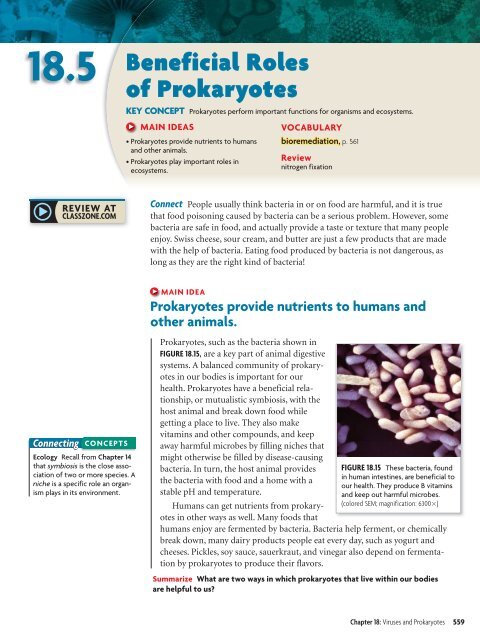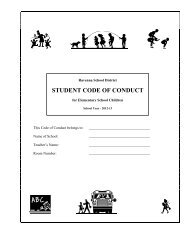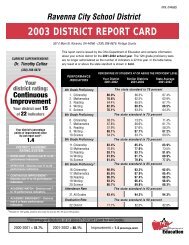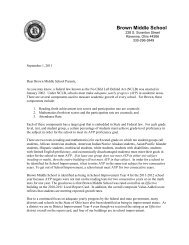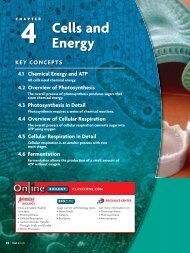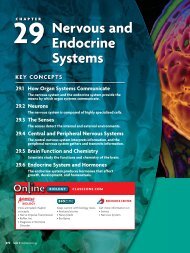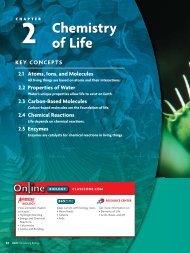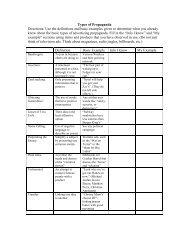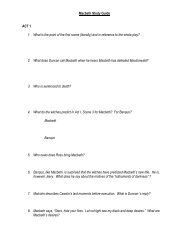18.1 Studying Viruses and Prokaryotes
18.1 Studying Viruses and Prokaryotes
18.1 Studying Viruses and Prokaryotes
Create successful ePaper yourself
Turn your PDF publications into a flip-book with our unique Google optimized e-Paper software.
18.5Beneficial Rolesof <strong>Prokaryotes</strong>KEY CONCEPT <strong>Prokaryotes</strong> perform important functions for organisms <strong>and</strong> ecosystems.MAIN IDEAS• <strong>Prokaryotes</strong> provide nutrients to humans<strong>and</strong> other animals.• <strong>Prokaryotes</strong> play important roles inecosystems.VOCABULARYbioremediation, p. 561Reviewnitrogen fixationConnect People usually think bacteria in or on food are harmful, <strong>and</strong> it is truethat food poisoning caused by bacteria can be a serious problem. However, somebacteria are safe in food, <strong>and</strong> actually provide a taste or texture that many peopleenjoy. Swiss cheese, sour cream, <strong>and</strong> butter are just a few products that are madewith the help of bacteria. Eating food produced by bacteria is not dangerous, aslong as they are the right kind of bacteria!MAIN IDEA<strong>Prokaryotes</strong> provide nutrients to humans <strong>and</strong>other animals.ConnectingCONCEPTSEcology Recall from Chapter 14that symbiosis is the close associationof two or more species. Aniche is a specific role an organismplays in its environment.<strong>Prokaryotes</strong>, such as the bacteria shown inFIGURE <strong>18.1</strong>5, are a key part of animal digestivesystems. A balanced community of prokaryotesin our bodies is important for ourhealth. <strong>Prokaryotes</strong> have a beneficial relationship,or mutualistic symbiosis, with thehost animal <strong>and</strong> break down food whilegetting a place to live. They also makevitamins <strong>and</strong> other compounds, <strong>and</strong> keepaway harmful microbes by filling niches thatmight otherwise be filled by disease-causingbacteria. In turn, the host animal providesthe bacteria with food <strong>and</strong> a home with astable pH <strong>and</strong> temperature.FIGURE <strong>18.1</strong>5 These bacteria, foundin human intestines, are beneficial toour health. They produce B vitamins<strong>and</strong> keep out harmful microbes.(colored SEM; magnification: 6300)Humans can get nutrients from prokaryotesin other ways as well. Many foods thathumans enjoy are fermented by bacteria. Bacteria help ferment, or chemicallybreak down, many dairy products people eat every day, such as yogurt <strong>and</strong>cheeses. Pickles, soy sauce, sauerkraut, <strong>and</strong> vinegar also depend on fermentationby prokaryotes to produce their flavors.Summarize What are two ways in which prokaryotes that live within our bodiesare helpful to us?Chapter 18: <strong>Viruses</strong> <strong>and</strong> <strong>Prokaryotes</strong> 559


